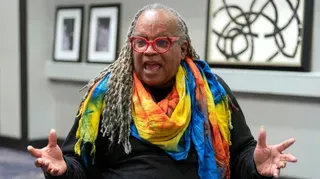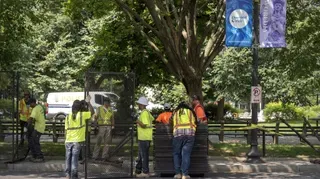February 20, 2014
SF Chamber Cites Housing Need
Kilian Melloy READ TIME: 4 MIN.
The local economy may be booming, but San Francisco residents said in a recent poll that the cost of housing is their top concern, even outpacing homelessness, business leaders said at a recent breakfast meeting.
In the San Francisco Chamber of Commerce's annual CityBeat poll, 34 percent of respondents said that the cost of owning a home was their chief concern, up 14 percent from the previous year. Twenty-one percent cited rental affordability as their major issue, up 17 percent from 2013.
While 29 percent stated that homelessness and street behavior was the city's number one problem, the current poll is the first in which housing costs trumped quality of life concerns.
On February 18, the chamber of commerce held its annual CityBeat breakfast at the SF Marriott Marquis Hotel. Dubbed "Managing Economic Success," the primary focus of a panel discussion and speeches was to address the city's affordable housing shortage, as well as how to manage the rising population.
KPIX news anchor Ken Bastida served as the morning's master of ceremonies. After a short introduction by Bob Linscheid, president and CEO of the San Francisco Chamber of Commerce, the City Beat poll results were shown on screen. The poll of 500 city voters was conducted in January and has a margin of error of plus or minus 4.4 percent.
The chamber's Workforce Housing Panel then took to the stage. Tim Colen, executive direction of the Housing Action Coalition, served as moderator. He was joined by Sean Kieghran, president of the Residential Builders Association; Oz Erickson, chairman of the Emerald Fund; and John Rahaim, the city's planning director.
"It's not news that we're in the middle of a housing crisis," Colen said as he introduced the panel. "San Francisco has the lowest rate of housing construction of all the U.S. tech hubs. Seattle produces double the amount of housing that we do. San Francisco has always had rules which make it time consuming and risky to build new housing. Tell your elected officials to make it easier: housing projects should not be subjected to a very long series of hoops to jump through."
Rahaim, who is openly gay, offered a historical perspective on the housing crunch.
"There are three issues driving the housing demand," Rahaim said. "Baby boomers are retiring and moving back to the city; job growth; and the millennial generation is moving into cities. The problems we have today are caused by 20 years of under-building. We need to focus on a long term strategy to increase our supply."
Erickson explained that the cost of building new units could affect their eventual market price, and why there's been hesitation on the part of developers to build affordable units.
"Out of pocket cost is $650,000 per unit for the builder," he said. "What does that mean in terms of the rents you have to pay? People don't understand economics. It takes $5,600 per month for a two bedroom in order to make the costs back."
Housing is also needed in the city's neighborhoods, Kieghran said.
"San Francisco needs smaller scale housing out in the neighborhoods," said Kieghran. "People, often immigrants, often have to put up their college funds and savings for a home. When you have to jump through hoops for one to two years, it's not worth it."
Rahaim talked about what could be done to increase density. He suggested streets such as the Geary and Clement corridors in the Richmond district as areas where new construction could be planned.
"I'm a big believer in affordable housing," he said. He pointed to the Marina, which he called one of the city's nicest areas. He noted that neighborhood's pattern of larger, multi-unit buildings on corners, with smaller houses in between.
"Change zoning laws and do this in the Western Addition," he said.
Kieghran suggested that the Board of Supervisors should lose its power to create zoning ordinances. "We need accountability for the long haul," he said. "Supervisors don't think about the long haul."
The need for family housing was discussed.
"There are so few kids in San Francisco," Erickson pointed out. "It's difficult to build three bedroom units: you have to prove to the banks that your units will sell."
Concerns were expressed for congestion, and the possibility that San Francisco could become as dense as Manhattan.
"We're growing by ten thousand people a year," said Rahaim. "We have a lot of undeveloped land. We also need to develop public transit, biking, and walking as an alternative to driving."
"The city is going to grow by 200,000 people," said Erickson. "The Bay Area will grow by over a million. It's going to happen whether we plan for it or not."
After the panel's conclusion, former Mayor Willie Brown took to the podium to thunderous applause. During his speech, he said that he was alarmed to see organized labor and protesters speaking out against the policy of offering incentives to bring businesses to the city. Many activists have been sharply critical of the tax breaks given to Twitter in order to get the tech giant to set up its headquarters at Market and 8th streets. Other start-ups have also taken advantage of the tax breaks.
"There's no justification for interfering with incentives," Mr. Brown said.
Brown, the city's first African American mayor, also raised the issue of race. "There are people who don't want people of different races, colors, and cultures to come here," he said. "Why haven't we thought of making Third Street a corridor and rezone it so housing can be built?" Third Street is the major thoroughfare in the Bayview, a largely African American neighborhood.
Brown called for the appointment of a housing czar. "The czar would be your and my advocate," he said. "The czar would ask what are you doing to increase productivity and let the world know." He called upon the chamber to drive the process to create housing.
Kilian Melloy serves as EDGE Media Network's Associate Arts Editor and Staff Contributor. His professional memberships include the National Lesbian & Gay Journalists Association, the Boston Online Film Critics Association, The Gay and Lesbian Entertainment Critics Association, and the Boston Theater Critics Association's Elliot Norton Awards Committee.





